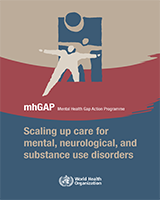All rights reserved. Publications of the World Health Organization can be obtained from WHO Press, World Health Organization, 20 Avenue Appia, 1211 Geneva 27, Switzerland (tel.: +41 22 791 3264; fax: +41 22 791 4857; e-mail: tni.ohw@sredrokoob). Requests for permission to reproduce or translate WHO publications – whether for sale or for noncommercial distribution – should be addressed to WHO Press, at the above address (fax: +41 22 791 4806; e-mail: tni.ohw@snoissimrep).
NCBI Bookshelf. A service of the National Library of Medicine, National Institutes of Health.
Mental, neurological and substance use disorders are highly prevalent and burdensome globally. The gap between what is urgently needed and what is available to reduce the burden is still very wide.
WHO recognizes the need for action to reduce the burden, and to enhance the capacity of Member States to respond to this growing challenge. mhGAP is WHO’s action plan to scale up services for mental, neurological and substance use disorders for countries especially with low and lower middle incomes. The priority conditions addressed by mhGAP are: depression, schizophrenia and other psychotic disorders, suicide, epilepsy, dementia, disorders due to use of alcohol, disorders due to use of illicit drugs, and mental disorders in children. The mhGAP package consists of interventions for prevention and management for each of these priority conditions.
Successful scaling up is the joint responsibility of governments, health professionals, civil society, communities, and families, with support from the international community. The essence of mhGAP is building partnerships for collective action.
Contents
- Foreword
- Preface
- Executive summary
- The challenge and the need
- Mental Health Gap Action Programme
- Framework for country action
- Building partnerships
- The time to act is now!
- Annex 1 Public health burden associated with priority conditions included in mhGAP
- Annex 2 Burden attributable to mental, neurological, and substance use disorders and the available human resources in countries with low and lower middle incomes
- Recommended reading
- WHO Regional Offices
The designations employed and the presentation of the material in this publication do not imply the expression of any opinion whatsoever on the part of the World Health Organization concerning the legal status of any country, territory, city or area or of its authorities, or concerning the delimitation of its frontiers or boundaries. Dotted lines on maps represent approximate border lines for which there may not yet be full agreement.
The mention of specific companies or of certain manufacturers’ products does not imply that they are endorsed or recommended by the World Health Organization in preference to others of a similar nature that are not mentioned. Errors and omissions excepted, the names of proprietary products are distinguished by initial capital letters.
All reasonable precautions have been taken by the World Health Organization to verify the information contained in this publication. However, the published material is being distributed without warranty of any kind, either expressed or implied. The responsibility for the interpretation and use of the material lies with the reader. In no event shall the World Health Organization be liable for damages arising from its use.
- NLM CatalogRelated NLM Catalog Entries
- Review Global Priorities for Addressing the Burden of Mental, Neurological, and Substance Use Disorders.[Mental, Neurological, and Subs...]Review Global Priorities for Addressing the Burden of Mental, Neurological, and Substance Use Disorders.Patel V, Chisholm D, Parikh R, Charlson FJ, Degenhardt L, Dua T, Ferrari AJ, Hyman S, Laxminarayan R, Levin C, et al. Mental, Neurological, and Substance Use Disorders: Disease Control Priorities, Third Edition (Volume 4). 2016 Mar 14
- Review Update of the Mental Health Gap Action Programme (mhGAP) Guidelines for Mental, Neurological and Substance Use Disorders, 2015[ 2015]Review Update of the Mental Health Gap Action Programme (mhGAP) Guidelines for Mental, Neurological and Substance Use Disorders, 2015. 2015 May
- Review mhGAP Intervention Guide for Mental, Neurological and Substance Use Disorders in Non-Specialized Health Settings: Mental Health Gap Action Programme (mhGAP): Version 2.0[ 2016]Review mhGAP Intervention Guide for Mental, Neurological and Substance Use Disorders in Non-Specialized Health Settings: Mental Health Gap Action Programme (mhGAP): Version 2.0. 2016
- Review WHO mental health gap action programme (mhGAP) intervention guide: updated systematic review on evidence and impact.[Evid Based Ment Health. 2021]Review WHO mental health gap action programme (mhGAP) intervention guide: updated systematic review on evidence and impact.Keynejad R, Spagnolo J, Thornicroft G. Evid Based Ment Health. 2021 Apr 26; 24(3):124-30. Epub 2021 Apr 26.
- A Pilot Initiative to Deliver Community-based Psychiatric Services in Rural Haiti After the 2010 Earthquake.[Ann Glob Health. 2015]A Pilot Initiative to Deliver Community-based Psychiatric Services in Rural Haiti After the 2010 Earthquake.Grelotti DJ, Lee AC, Fils-Aimé JR, Jean JS, Therosmé T, Petit-Homme H, Oswald CM, Raviola G, Eustache E. Ann Glob Health. 2015 Sep-Oct; 81(5):718-24.
- mhGAP: Mental Health Gap Action ProgrammemhGAP: Mental Health Gap Action Programme
Your browsing activity is empty.
Activity recording is turned off.
See more...
